Two years of reading (2017-19)
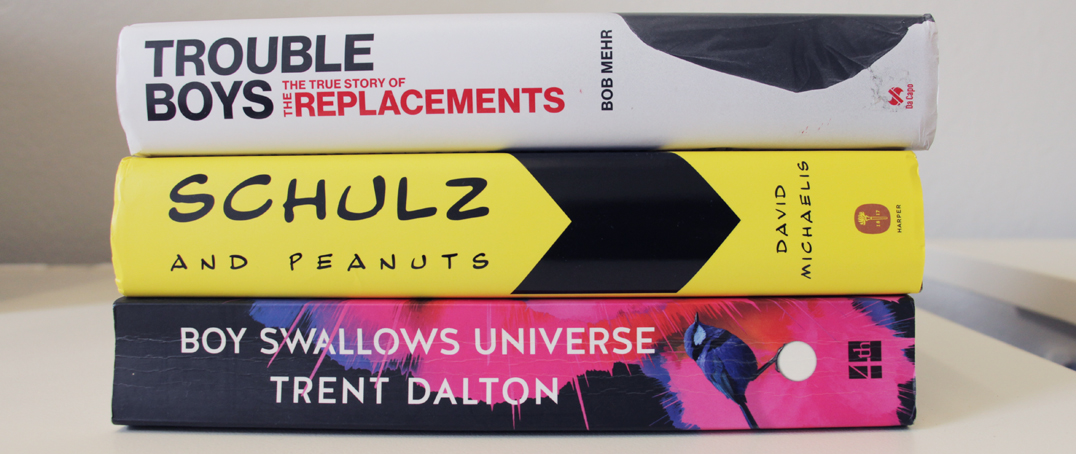
Top book recommendations
As with past years, I am using this as an opportunity to declare my favourite books that I read during the past two years. Here’s my Top 3 countdown of the best books that I during the period 2017-2019:
#3: Boy Swallows Universe (2018) by Trent Dalton
Long hailed as one of Australia’s best feature writers, Trent Dalton wowed me with his debut novel Boy Swallows Universe.
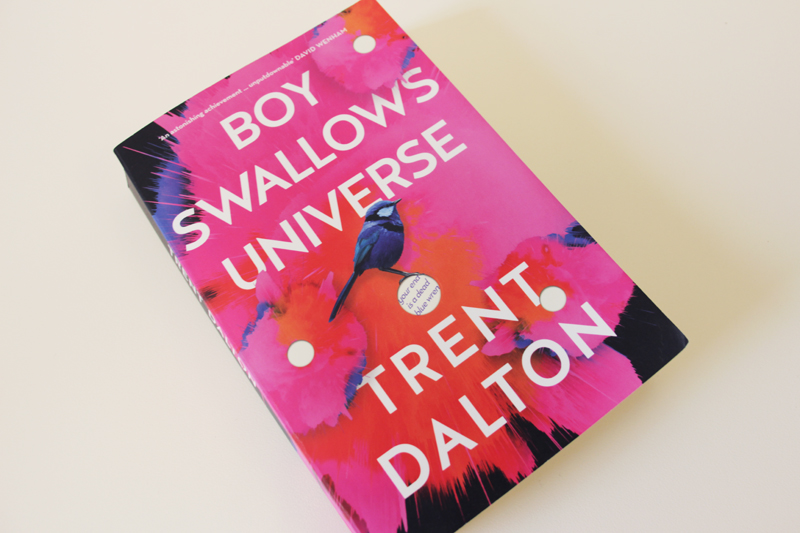
The book is about a Brisbane family in the 1980s. This is territory that Dalton knows well, having himself grown up in a housing commission property in Brisbane’s Bracken Ridge. The family at the centre of the book is poor, and involved with drug dealing and alcoholism. But the family members are held together by love, and the protagonist Eli has a heart of gold.
Trent’s sparkling prose wonderfully illustrates the sights, sounds, and smells of Brisbane during that naive time. This is a book that drew me in deeper and deeper as I went. Glued to my bed, I read the gripping final hundred pages in a two-hour session!
Boy Swallows Universe by Trent Dalton is the best fiction book that I read during this period.
#2: Schulz and Peanuts: A Biography (2007) by David Michaelis
Peanuts cartoonist Charles Schulz died in 2000, but writer David Michaelis waited seven years before publishing this wonderful biography. It was worth the wait. This book is everything that a biography should be, with exceptional research feeding into extremely readable prose.
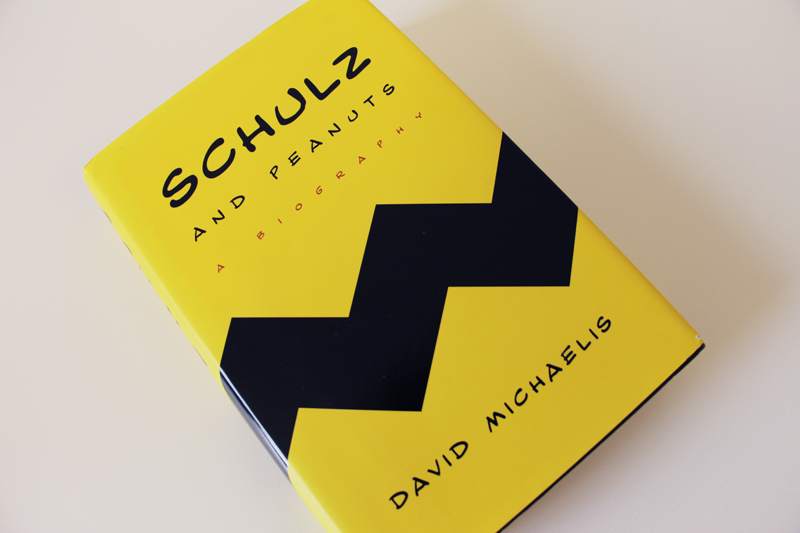
An only child, Schulz’s life was profoundly affected by the untimely death of his mother when he was aged 20. Schulz was a sensitive soul, but followed his family’s Midwestern tendencies to bury his feelings. Though identifying as a polite small-town son of a barber, he harboured competitive drive to succeed as a cartoonist and prove himself to the world. All of these things came out through his cartoon character Charlie Brown, who served as Schulz’s avatar in the Peanuts universe.
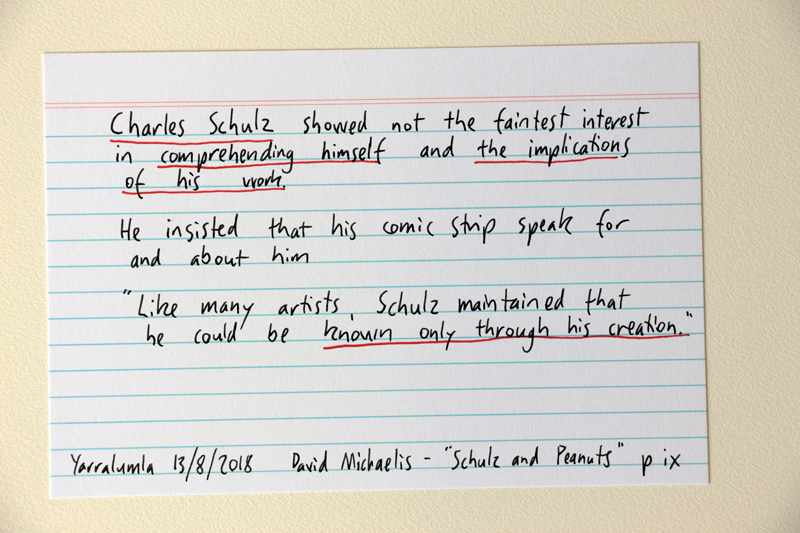
Charles Schulz drew 17,897 strips of Peanuts, a talk that he refused to delegate to others. Michaelis calls it “arguably the longest story told by one human being”, as Schulz was the only person to write, pencil, draw, and letter the strip. As a cartoonist, Schulz broke new ground to redefine what comics could be. The humour of Peanuts drew from the melancholy of Charlie Brown, Schulz’s stand-in character.
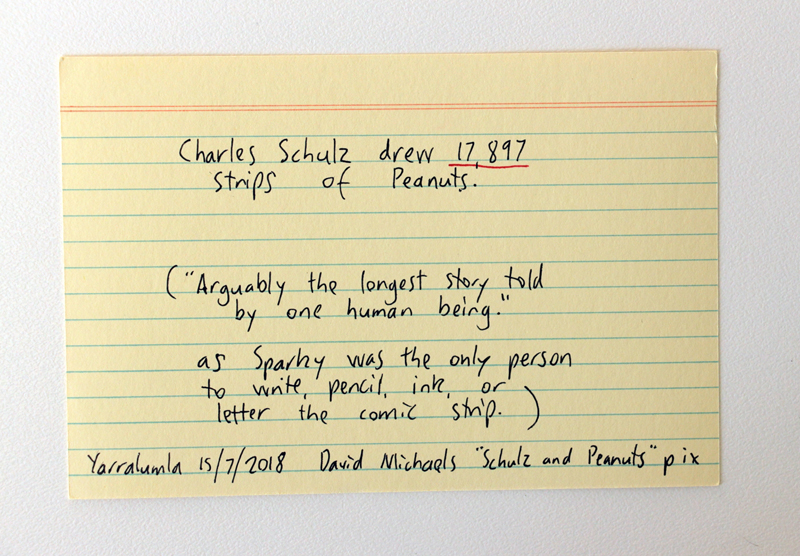
As biographer, Michaelis uses amazing X-ray vision to see what was happening beneath the surface of the Peanuts strips. Very often, the themes of the strips symbolised events that were occurring in Schulz’s own personal life. The overbearing character of Lucy van Pelt came to symbolise the cartoonist’s first wife Joyce, who left Schulz in the early 70s. Michaelis’s description of the events in Schulz’s life are frequently juxtaposed with relevant cartoon strips that Schulz drew at the time. The strips show how Schulz reflected his experiences through his characters.
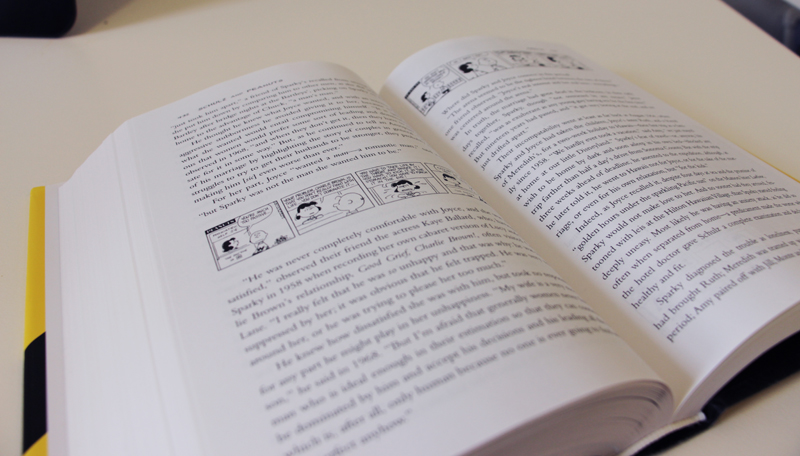
Reading the book, I was amazed at the level of detail that Michaelis was able to dredge up about Schulz’s life. Particularly the description of Schulz’s extramarital affair with a 25-year-old woman, which is recounted in vivid detail. I also particularly like the three page section explaining Schulz’s daily routine inside his cartoon studio. Below is part of the flavour of those pages.
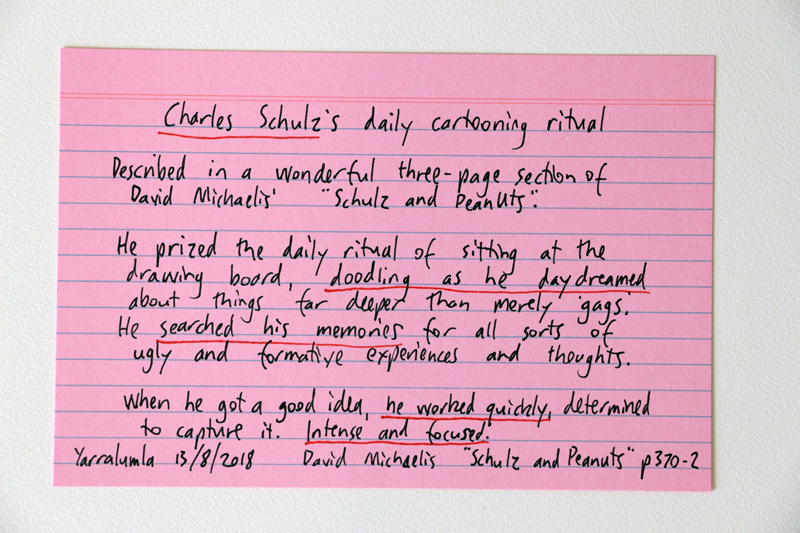
Schulz and Peanuts: A Biography by David Michaelis is an exceptional biography, and was a pleasure for me to read.
#1: Trouble Boys: The True Story of the Replacements (2016) by Bob Mehr
Topping this list is Trouble Boys: The True Story of the Replacements by Bob Mehr, which profiles the infamous Minneapolis rock band.
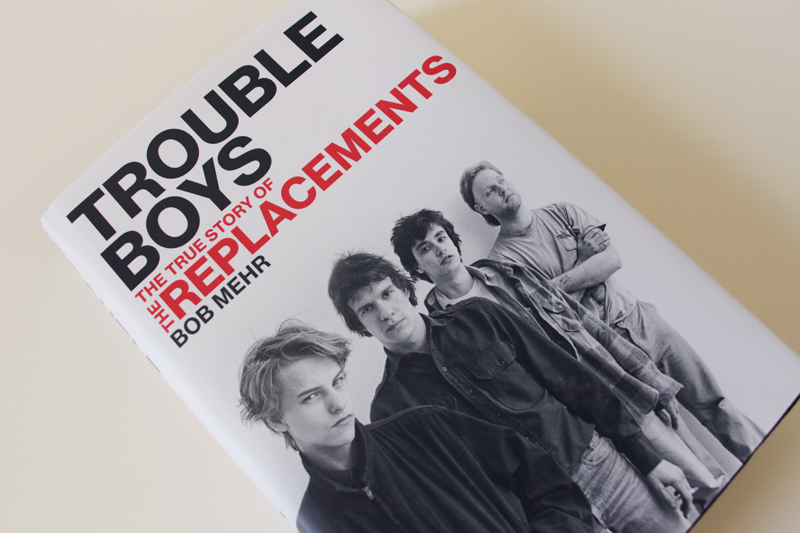
Let me add myself to the chorus of reviewers calling this one of the best rock biographies ever written. Bob Mehr went to extraordinary lengths as a biographer, taking seven years to chase up 230 interviews with people who were only tangentially connected to The Replacements. For example, as Mehr told Jon Wurster at a book launch, tracking down the owner of the obscure venue that hosted the band’s disastrous first gig.
The book is a mixture of sorrow and hijinks. All members of The Replacements came from troubled backgrounds, and drank heavily to mask their pains and insecurities. Their road antics were legendarily self-destructive. Important gigs for music industry bigwigs were intentionally sabotaged with bad performances. On the flipside, unexceptional venues were treated to transcendent performances that left lifelong impressions for its audience members.
I was continuously delighted by the sheer number and diversity of road antics that Bob Mehr was able to compile for this book. Memorable highlights include: the surprise transformation of drummer Chris Mars into his drunk alter-ego “Pappy the Clown” during occasional gigs; the time when the band members decided to start a fire inside their tour van(!) to overcome boredom while travelling on the freeway; and ordering wallpaper to paper-over a dressing room that was covered in autographs by famous musicians. All members of the band shine through with their own distinctive personalities. Mehr’s writing leaves the reader simultaneously impressed and appalled by their behaviour.
But of course, the main reason we still remember The Replacements is the strength of their songs like “I Will Dare”, “Alex Chilton”, and “Can’t Hardly Wait”. As well as chronicling the band’s antics, Mehr also illuminates the creative decisions that led to the band’s songs and albums.
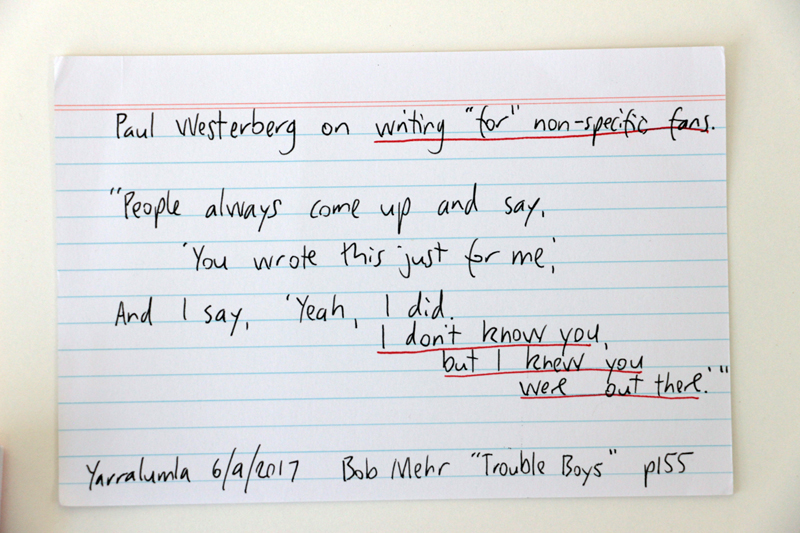
Trouble Boys: The True Story of the Replacements (2016) by Bob Mehr is my favourite book that I read during 2018. Indeed, it probably edges out Pat Gilbert’s Passion Is a Fashion: The Real Story of the Clash as my favourite rock bio of all time. Grab it.
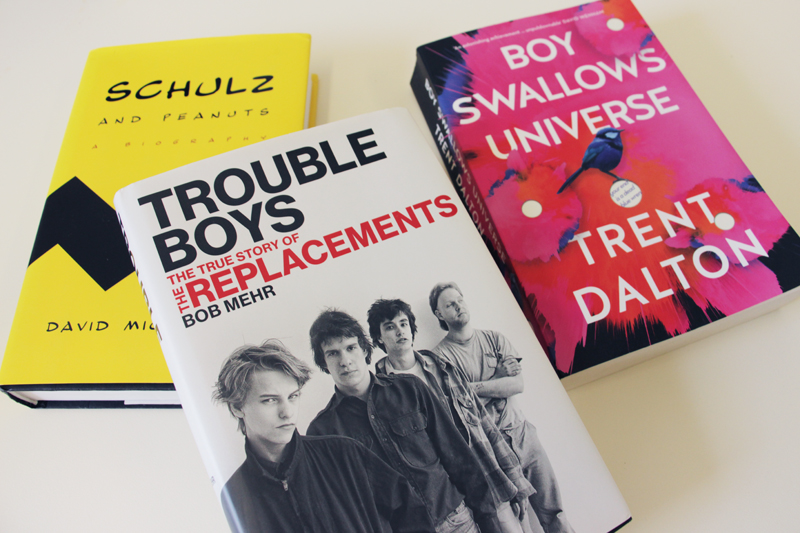
Full list of books read 2017-19
For my sake as much as yours, here is the list of all the books I’ve read in the last 2 years. This follows on from my previous five reading lists: 2008-09, 2009-10, 2011-13, 2013-15, and 2015-17.
Fiction
- “Boy Swallows Universe” – Trent Dalton (2018)
- “Barracuda” – Christos Tsiolkas (2013)
- “The Slap” – Christos Tsiolkas (2008)
- “The Body Artist” – Don DeLillo (2001)
- “Hard-Boiled Wonderland and the End of the World” – Haruki Murakami (1985)
- “Do Androids Dream of Electric Sheep?” – Philip K. Dick (1962)
Biography
Architecture / design / urban planning
- “Wrestling with Moses : How Jane Jacobs Took on New York’s Master Builder and Transformed the American City” – Anthony Flint (2009)
- “City Comforts: How to Build an Urban Village” – David Sucher (1994)
Environment / energy / sustainability / economics
- “The Growth Delusion: Wealth, Poverty, and the Well-Being of Nations” – David Pilling (2018)
- “Dead Right: How Neoliberalism Ate Itself and What Comes Next” [Quarterly Essay 70] – Richard Denniss (2018)
- “Curing Affluenza: How to buy less stuff and save the world” – Richard Denniss (2017)
- “Drawdown: The Most Comprehensive Plan Ever Proposed to Reverse Global Warming” – Paul Hawken (2017)
- “Game of Mates : How Favours Bleed the Nation” – Cameron Murray & Paul Frijters (2017)
- “Kenneth Boulding: A Voice Crying in the Wilderness” [Great Thinkers in Economics] – Robert Scott (2014)
- “Capital in the Twenty-First Century” – Thomas Piketty (2013)
- “Our Common Wealth: The Hidden Economy That Makes Everything Else Work” – Jonathan Rowe (2013)
- “The Self-Made Myth: And the Truth about How Government Helps Individuals and Businesses Succeed” – Brian Miller and Mike Lapham (2012) (2013)
- “Meme Wars: The Creative Destruction of Neoclassical Economics” – Kalle Lasn and Adbusters (2012)
- “What Matters? Economics for a Renewed Commonwealth” – Wendell Berry (2010)
- “Falling Behind: How Rising Inequality Harms the Middle Class” – Robert H. Frank (2007)
- “Affluenza: When Too Much is Never Enough” – Clive Hamilton and Richard Denniss (2005)
- “Growth Fetish” – Clive Hamilton (2003)
- “Luxury Fever : Weighing the Cost of Excess” – Robert H. Frank (1999)
- “Counting for Nothing: What Men Value and What Women are Worth” – Marilyn Waring (1988)
- “Creative Tension: The Life and Thought of Kenneth Boulding” – Cynthia Earl Kerman (1974)
Memoir / essays
- “Detours” – Tim Rogers (2017)
- “Woman of Substances” – Jenny Valentish (2017)
- “Reasons to Stay Alive” – Matt Haig (2015)
- “The Art of Asking: How I Learned to Stop Worrying and Let People Help” – Amanda Palmer (2014)
- “How to Be a Woman” – Caitlin Moran (2011)
- “What I Talk About When I Talk About Running” – Haruki Murakami (2007)
- “Man’s Search for Meaning” – Viktor Frankl (1946)
Music
- “Trouble Boys: The True Story of the Replacements” – Bob Mehr (2016)
- “Big Day Coming: Yo La Tengo and the Rise of Indie Rock” – Jesse Jarnow (2012)
- “This Is a Call: The Life and Times of Dave Grohl” – Paul Brannigan (2011)
- “See A Little Light: The Trail of Rage and Melody” – Bob Mould (2011)
Politics
- “Trigger Warnings: political correctness and the rise of the right” – Jeff Sparrow (2018)
- “Down Girl: The Logic of Misogyny” – Kate Manne (2017)
- “Depends What You Mean By Extremist: Going Rogue with Australian Deplorables” – John Safran (2017)
- “The Luck of Politics: True Tales of Disaster and Outrageous Fortune” – Andrew Leigh (2015)
- “Decolonizing Solidarity: Dilemmas and Directions for Supporters of Indigenous Struggles” – Clare Land (2015)
- “What Money Can’t Buy: The Moral Limits of Markets” – Michael J. Sandel (2012)
- “Culture Jam: How To Reverse America’s Suicidal Consumer Binge – And Why We Must” – Kalle Lasn (1999)
- “No Logo: Taking Aim at the Brand Bullies” – Naomi Klein (1999)
- “White Women, Race Matters: The Social Construction of Whiteness” – Ruth Frankenberg (1993)
Psychology / society
- “The World Beyond Your Head: On Becoming an Individual in an Age of Distraction” – Matthew Crawford (2015)
- “The Utopia of Rules: On Technology, Stupidity, and the Secret Joys of Bureaucracy” – David Graeber (2015)
- “The Tyranny of E-mail: The Four-Thousand-Year Journey to Your Inbox” – John Freeman (2009)
- “Technopoly : the Surrender of Culture to Technology” – Neil Postman (1993)
History
- “Inked: Australian Cartoons” – Guy Hansen (2019)
- “Building a Bridge to the 18th Century: How the Past Can Improve Our Future” – Neil Postman (1999)
Money / finance
- “Your Money Or Your Life: 9 Steps to Transforming Your Relationship with Money and Achieving Financial Independence” – Vicki Robin and Joe Dominguez (2018)
- “Early Retirement Extreme: A Philosophical and Practical Guide to Financial Independence” – Jacob Lund Fisker (2010)
Miscellaneous literature / fiction
- “120 Banned Books : Censorship Histories of World Literature” – Nicholas Karolides (2005)
- “The Fine Art Of Small Talk : How to start a conversation in any situation” – Debra Fine (1997)
Creativity / the process of writing
- “Hyperfocus: How to Be More Productive in a World of Distraction “ – Chris Bailey (2018)
- “Deep Work: Rules for Focused Success in a Distracted World” – Cal Newport (2016)
- “How to be a Writer” – John Birmingham (2016)
- “Big Magic: Creative Living Beyond Fear” – Elizabeth Gilbert (2015)
- “Funemployed: Life as an artist in Australia” – Justin Heazlewood (2014)
- “Poke the Box: When Was the Last Time You Did Something for the First Time?” – Seth Godin (2011)
Comics / graphic novels: fiction
- “Body Music” – Julie Maroh (2017)
- “The Sculptor” – Scott McCloud (2015)
- “The Underwater Welder” – Jeff Lemire (2012)
- “Blue Is the Warmest Colour” – Lars Martinson (2010)
- “Asterios Polyp” – David Mazzucchelli (2009)
- “Tonoharu: Part One” – Alison Bechdel (2008)
- “The Essential Dykes to Watch Out For” – Alison Bechdel (2008)
- “Bookhunter” – Jason Shiga (2007)
- “Good-Bye, Chunky Rice” – Craig Thompson (2006)
- “The Snake Pit Book” – Ben Snakepit (2004)
- “Transmetropolitan, Vol. 2: Lust for Life” – Warren Ellis and Darick Robertson (1999)
- “Transmetropolitan, Vol. 1: Back on the Street” – Warren Ellis and Darick Robertson (1998)
- “Preacher, Volume 2: Until the End of the World” – Garth Ennis and Steve Dillon (1997)
- “Preacher, Volume 1: Gone to Texas” – Garth Ennis and Steve Dillon (1996)
- “City of Glass” – Paul Karasik and David Mazzucchelli adapting Paul Auster (1994)
Comics / graphic novels: non-fiction
- “Twists of Fate” – Paco Roca (2019)
- “Theft: A History of Music” – James Boyle and Jennifer Jenkins (2017)
- “Footnotes in Gaza” – Joe Sacco (2009)
Comics / graphic novels: memoirs
Television, television’s impact on communities
- “Four Arguments for the Elimination of Television” – Jerry Mander (1978)
- “Broadcast Television Effects in A Remote Community” – Tony Charlton, Barrie Gunter & Andrew Hannan (2002)
- “Amusing Ourselves to Death: Public Discourse in the Age of Show Business” – Neil Postman (1985)
- “How to Watch TV News” – Neil Postman & Steve Powers (1992)
- “The Impact of Television: a Natural Experiment in Three Communities” – Tannis MacBeth Williams (1986)
- “Bowling Alone: The Collapse and Revival of American Community” – Robert D. Putnam (2000)
- “The Plug-In Drug: Television, Children, And The Family” – Marie Winn (1977)
- “Children & Television, second edition” – Barrie Gunter & Jill McAleer (1997)
- “Television and the American Child” – George Comstock & HaeJung Paik (1991)








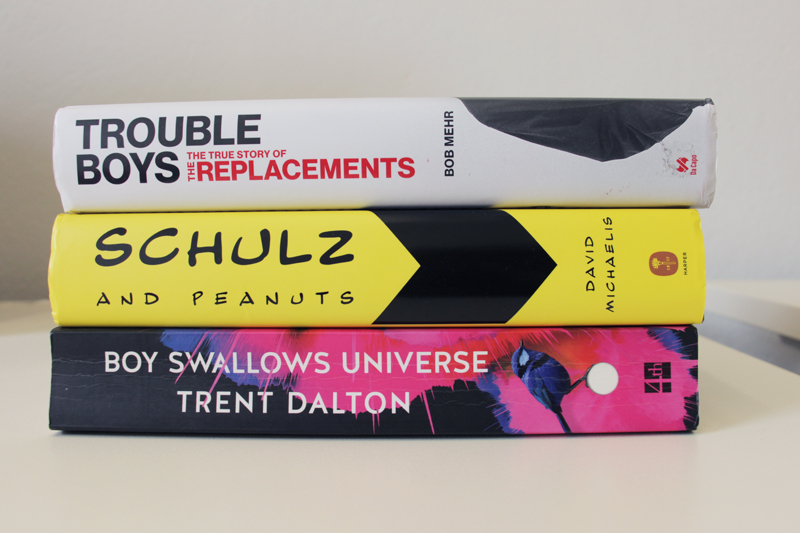



Comments
Scott
Wow, this is an impressive list. I read a lot, and I am now wondering how I'd manage to go back and (a) remember what I read, and (b) see how much I retained from each book. It might be one of those tasks which is easier to do with some forward planning :)
Sandra Kanck
Oh how I envy you that number of books. For the two years 2017-18 I managed 39 in total, although I wish there had been time in my life for more. Of all the books in your list the only one which had crossed my path was 'Bowling Alone' and what a compelling story that had to tell about the negative impact of the introduction of television. Of my 39 books read, the standout was a piece of young adult fiction by Justine Larbalestier 'My Sister Rosa' which was like watching a slow-moving crash, which - given that analogy - has to end with a death, but also with an utterly unexpected consequence. Although I know a few sociopaths, this novel taught me things I did not know.
Gretchen Bernet-Ward
Three brilliant choices, three brilliant books which also mean so much to me.